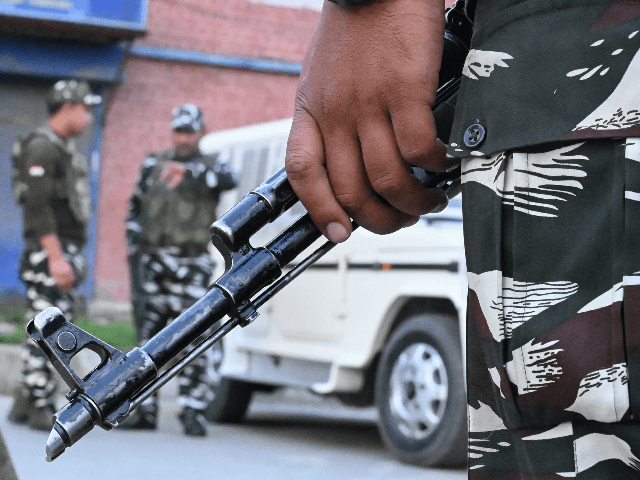India’s recent decision to declare Chinese Kashmir an area controlled by New Delhi brings the region to the brink of nuclear war, China’s state-run Global Times warned this week.
In a series of articles, the Global Times blasted India’s move in Kashmir last week, accusing New Delhi of annexing the portion of the Muslim-majority region administered by Beijing.
Last week, the Hindu nationalist-led Indian government revoked New Delhi-controlled Kashmir of its autonomy, angering China and its ally Pakistan. As part of its decision, India also declared part of the Beijing-controlled Kashmir lands to be a territory administered by the Indian federal government.
Pakistan, its ally China, and their mutual rival India all have competing claims to Kashmir territories. Both China and Pakistan have engaged in military conflicts with India over the region.
Pakistan has warned of war over India’s Kashmir decision last week. Islamabad downgraded its diplomatic relations with New Delhi, expelling the Indian ambassador.
In an op-ed issued Monday and titled “India’s Unilateral Kashmir Move Unwise, Dangerous,” the Global Times declared:
Although a chance of nuclear war remains remote, any steps taken by a nuclear-armed India to provoke a nuclear-armed Pakistan or a nuclear-armed China are clearly matters which should concern the wider world. In this sense, the threat of such a war is sadly closer than it was just weeks ago.
The Global Times went on to note that India’s recent decision over its Kashmir territory “amounts to an annexation of a disputed territory.”
“As Pakistan has vowed not to let the move go unanswered, another India-Pakistan war is now all the more real a possibility,” it added.
In a separate op-ed issued Monday, the Global Times proclaimed, “New Delhi is too reckless on border issues,” further noting:
The Kashmir issue is highly complicated and India’s move also hurts China’s interests. … Its actions challenge surrounding countries’ interests, but it wants these countries to swallow the provocation and accept the new facts made by India. … It is unimaginable if Pakistan does not take strong countermeasures.
The Global Times went on to caution, “New Delhi is much too confident.”
It stressed that New Delhi’s unilateral decision over Kashmir would incur risks for India, adding:
Pakistan is a nuclear power and its state apparatus has loose control over local forces [in all of Kashmir]. It would be a wiser choice for India not to squeeze its neighbor. … If New Delhi uses nationalism to support its reckless diplomatic moves, a vicious spiral will be launched. India will have to be increasingly radical. A nationalist India has no future.
A third Global Times article published Monday and billed as an objective news report covered India’s foreign minister’s recent visit to Beijing.
Citing comments from Chinese Foreign Minister Wang Yi to his Indian counterpart Subrahmanyam Jaishankar, the Global Times reported:
Wang said China is concerned about the current Kashmir situation and the escalating India-Pakistan conflict. … India’s move is neither valid to China nor will change the status quo that China exercises sovereignty and administrative jurisdiction over the territories involved, Wang stressed. Jaishankar expressed India’s stance, noting that India’s constitutional amendment won’t create new sovereignty claims, won’t change the LoC [Line of Control] in the Kashmir region and won’t change the control line on the China-India border.
Pakistan and India claim ownership of the area in its entirety. However, a border — the LOC— separates the portions of Kashmir administered by India and Pakistan.
Islamabad has ceded some of its Kashmir lands to Beijing. India disputes China’s control of some of the territories on its side of the LOC.
Pakistan and India have already fought two wars and a minor conflict over Kashmir, considered one of the most militarized zones in the world. Despite a 2003 ceasefire, clashes between Pakistan and India continue along the LOC.
China and India have also fought a war over Kashmir.
“New Delhi’s unilateral decision will bite India back in the future, warned Chinese experts,” the Global Times pointed out.
India has long accused Islamabad of backing terrorists and separatists in Kashmir fighting for independence or a merger with Pakistan. Meanwhile, Pakistan accuses India of human rights violations, particularly against dissenters.
New Delhi-held Kashmir is the only Muslim-majority region in India.
Revoking Indian Kashmir of its autonomy has long been a goal of India’s ruling Hindu-nationalist party. Human rights groups and the United States have recently accused the Indian government of inciting hatred against Muslims.
Both China and Pakistan have claimed India’s recent Kashmir decision will lead to “genocide” or “ethnic cleansing.” India’s Kashmir move came amid an ongoing security lockdown and a communication blackout, including the blocking of phone lines, the internet, and news outlets.

COMMENTS
Please let us know if you're having issues with commenting.